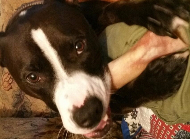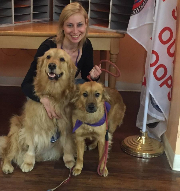 |
Montreal legislators dealt a serious blow to a large group of dogs when they passed a new law this week banning any dog that resembles a Pit Bill (a general name for a few different kinds of terriers) from being newly adopted or purchased. As per The Dodo this will impact hundreds of shelter dogs and could also affect dogs currently residing in low-income homes where people cannot afford to meet the new ownership requirements.
The decision came after the death of a Montreal woman who died following a canine attack. DNA testing has not yet been completed to verify this dog was a Pit Bull. Quebec's Order Of Veterinarians has stated, "no municipal regulation or provincial legislation can obligate a veterinarian to carry out any veterinary act," citing laws that give them the right to refuse to euthanize a healthy animal. Snopes.com
There is, in fact, no scientific evidence that pit bulls are a more dangerous breed and this Huffington Post article goes into detail regarding several myths about these dogs. I have worked with many sweet and loving Pit Bulls and would like to share an important post about one very special Pit Bull named Puller.
Puller The "Therapy Dog"
I spoke with Puller, a Pit Bull Terrier mix and his person, United States Marine Corp veteran, Jimmy Gervasio. Jimmy, a former Sergeant, served a total of 3 tours in Iraq and Afghanistan. Jimmy, Puller and I spoke about how Puller has helped Jimmy with symptoms of PTSD that resulted from his experiences in combat.
Puller Speaks
 Riding Along With Puller Riding Along With Puller |
Puller: I am 100 % in tune with my Dad (Jimmy) in a way that most people can't be. I help my Dad. I listen when no one else can. I understand. Puller shows me a melding of energy. Think of being near the energy of another being that just helps you feel calmer but this is tenfold coming from Puller because he is so completely present and free of ego. Puller is showing that he feels “one" with Jimmy, which contributes greatly to emotional healing.
Anne: Puller has a very powerful energy. This is not to be mistaken for any of the negative associations that some people have put forward about Pit Bulls. This is about Puller's sense of self. There is no hesitancy or confusion for Puller about who he is in this world. There are no self-esteem issues.
Anne: What would you like veterans, in general, to know?
Puller: Please consider us to help with (symptoms of PTSD).
Jimmy: A dog forces you to get up, feed them, leave the house. That's almost what he's (Puller) is talking about. The routine and structure of a therapy dog might have prevented using some treatment early on (that wasn't as helpful). With Puller, it's almost impossible to go through a day without smiling.
Puller: We'll take you on a ride (feels like actual motion like a car or roller coaster) but ground and calm you at the same time. Expand your heart. We will give you freedom. Sometimes I'm a co-pilot but sometimes I'm in control.
Puller and Jimmy
Anne: Puller shows me himself in the passenger seat of the car while Jimmy is driving. He feels that when he is in that seat that he is “working.” He is very aware of the road and what is on it. What Puller said above feels both literal and figurative. He loves “taking Jimmy in the car” and loves to go for a walk in the woods after that. However, he is also showing that his presence is causing positive forward (energetic) motion in Jimmy's' life and would be the case for other veterans with a dog.
Jimmy: He loves to ride in the car, especially the passenger seat but I don't feel it's safe. I strap him in for a shorter ride sometimes.
Puller: I am like my name (Puller is named after a very highly decorated Marine Corp veteran). I am always ready. I like to feel like I am in control. I try to take control of the situation. I know Jimmy has the final say, though.
Anne: What do you want people to know about veterans?
Puller: They have heart. And they have good hearts. People have to help them. We (dogs) help them naturally. People might care but they get distracted and then don't make an effort. I would like (veterans) to know that it will get better. Hold on. I tell Dad to keep going.
Anne: Is there anything else that either one of you would like to say?
Jimmy: Just that people don't have to walk on eggshells around (veterans). If people aren't sincere it's palpable. You don't have to treat veterans any differently. Also, the first dog I brought home from the shelter didn't work out and it was awful (having to take her back). Make sure it's the right dog for you and your lifestyle first. Also, if the dog is already trained it helps.
(See resource for trained therapy dogs for veterans at the end of this post)
 |
Because this is a Part II......
In my last blog I wrote about former U.S. Marine Corp Sergeant, Patrick Brown, who died rescuing people in the World Trade Center on 911. I knew about Pat Brown through my friend, Sharon Watts, whom I lived next door to for three years. Jimmy and I met several years ago as he was a former neighbor. Puller was one of the first dogs that my dog, Cheyenne, played with as a puppy.
When I moved to my current location, I discovered that Jimmy and Puller are neighbors, here, as well. Cheyenne is a therapy dog and visits a program that provides transitional housing for veterans. I have since come to find out that Jimmy has served in several capacities for the organization that oversees this program.
Puller: We are always being given chances to learn from each other.
Me: I certainly am learning. As I look up information for this article I am finding out about Puller's military namesake who I had not heard of before meeting the canine namesake.
Cheyenne: Puller is more powerful than me. It would be good for me to be “stronger” like him. (Cheyenne is referring to confidence, not physical strength).
Anne: Pat Brown spent his life trying to do good, to help people. Something not uncommon to PTSD survivors. However, just because something might be a “symptom” of something, does not mean it can't be utilized for good (and wasn't a natural characteristic in that person). I have seen and heard the same drive in Jimmy.
Anne:What have you learned from the veterans that you
visit, Cheyenne?
visit, Cheyenne?
Cheyenne: Puller is more powerful than me. It would be good for me to be “stronger” like him. (Cheyenne is referring to confidence, not physical strength).
Anne: Pat Brown spent his life trying to do good, to help people. Something not uncommon to PTSD survivors. However, just because something might be a “symptom” of something, does not mean it can't be utilized for good (and wasn't a natural characteristic in that person). I have seen and heard the same drive in Jimmy.
Anne:What have you learned from the veterans that you visit, Cheyenne?
Cheyenne: They might be broken in some ways but (and again we hear this same theme from another canine speaker) they have heart.
 |
| Cheyenne and friend Elsa on a visit to transitional living for veterans |
That Says It All
Creature Comfort Pet Therapy (where Cheyenne volunteers) http://ccpettherapy.org/
Learn More About The Oily Pets! Aromatherapy For Our
Best Friends
Join Us For This Fun Live Event
October 5th at the Crown Plaza, Fairfield, NJ
7:00PM-9:00PM
Register: http://theoilypets.eventbrite.com
